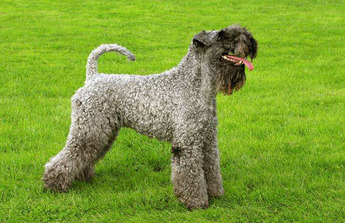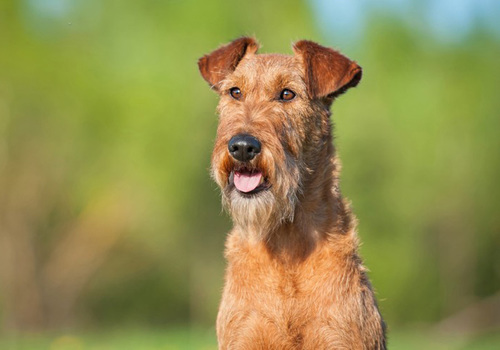The Irish Terrier doesn’t require a lot of grooming. Weekly brushing with a slicker brush keeps the coat in good condition. Bathe him only if he gets dirty. Trimming isn’t necessary, but many owners have their Irish Terriers groomed professionally three to four times a year for a neat appearance.
The coat is trimmed with clippers or by stripping, a process by which coat is thinned and shortened with a stripping knife, a sharp, comb-like tool, or a combination of both. The Irish Terrier Club of America has a helpfulguide to groomingthe coat.
The rest is basic care. Trim the nails as needed, usually once every week or two. Brush the teeth frequently with a vet-approved pet toothpaste for good overall health and fresh breath. Check the ears weekly for dirt, redness or a bad odor that can indicate an infection. If the ears look dirty, wipe them out with a cotton ball dampened with a gentle, pH-balanced ear cleaner recommended by your veterinarian.
Even though his grooming requirements are minimal, it is important to begin grooming the Irish Terrier when he is very young. An early introduction teaches him to accept grooming without any fuss.
Irish Terriers, although energetic, don’t need tons of exercise. A good, brisk walk each day and a trip to the dog park for rip-roaring fun each week will suffice.
This breed does enjoy running, so a fenced yard would surely be a plus. When not inside of a secure area, the Irish Terrier should always be kept on a leash.
His playful nature makes the Irish Terrier the perfect family companion. Children love the Irish Terriers desire and ability to catch a ball and bring it back to them. Both the dog and the kids will be tuckered out by the end of the day!
The Irish Terrier should be fed a high-qualitydog foodappropriate to the dog’s age (puppy, adult, or senior) and activity level. Dry food will help to prevent oral health problems such as tooth decay, bad breath and gum infections.
Learn about whichhuman foodsare safe for dogs, and which are not. Check with your vet or the dog’s breeder if you have any questions or concerns about your dog’s weight or diet. Clean, fresh water should always be available.
The average life expectancy of the Irish Terrier is 12 to 14 years. This is a healthy breed with few if any significant breed-related health conditions. Irish Terriers have been known to have familial footpad hyperkeratosis, melanoma, hypothyroidismandcataracts.
The Irish Terrier is very smart and willing to please, though he also tends to be strong-willed, independent, and challenging. Early and consistentsocializationand basicobedience traininghelp to ensure he will be a well-mannered member of your household who is comfortable with family and friends.
Training quickly establishes a bond between you and your Irish that will last a lifetime. Consistent use and reinforcement of early training should be a lifelong process. The Irish Terrier is a smart, quick dog who quickly adapts to new situations. This breed is great with children when raised with them and is deeply loyal to his owner. Pups require firm boundaries so they will grow into respectful adults.











